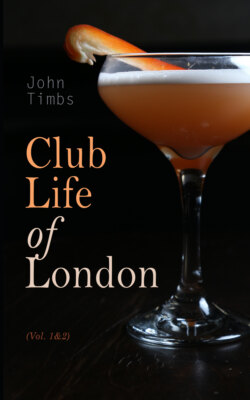Читать книгу Club Life of London (Vol. 1&2) - John Timbs - Страница 10
На сайте Литреса книга снята с продажи.
THE OCTOBER CLUB.
ОглавлениеTable of Contents
The writer of an excellent paper in the National Review, No. VIII., well observes that "Politics under Anne had grown a smaller and less dangerous game than in the preceding century. The original political Clubs of the Commonwealth, the Protectorate, and the Restoration, plotted revolutions of government. The Parliamentary Clubs, after the Revolution of 1688, manœuvred for changes of administration. The high-flying Tory country gentleman and country member drank the health of the King—sometimes over the water-decanter, and flustered himself with bumpers in honour of Dr. Sacheverell and the Church of England, with true-blue spirits of his own kidney, at the October Club," which, like the Beef Steak Club, was named after the cheer for which it was famed—October ale; or rather, on account of the quantities of the ale which the members drank. The hundred and fifty squires, Tories to the backbone, who, under the above name, met at the Bell Tavern, in King Street, Westminster, were of opinion that the party to which they belonged were too backward in punishing and turning out the Whigs; and they gave infinite trouble to the Tory administration which came into office under the leadership of Harley, St. John, and Harcourt, in 1710. The Administration were for proceeding moderately with their rivals, and for generally replacing opponents with partisans. The October Club were for immediately impeaching every member of the Whig party, and for turning out, without a day's grace, every placeman who did not wear their colours, and shout their cries.
Swift was great at the October Club, and he was employed to talk over those who were amenable to reason, and to appease a discontent which was hastily ripening into mutiny. There are allusions to such negotiations in more than one passage of the Journal to Stella, in 1711. In a letter, February 10, 1710–11, he says: "We are plagued here with an October Club; that is, a set of above a hundred Parliament men of the country, who drink October beer at home, and meet every evening at a tavern near the Parliament, to consult affairs, and drive things on to extremes against the Whigs, to call the old ministry to account, and get off five or six heads." Swift's Advice humbly offered to the Members of the October Club, had the desired effect of softening some, and convincing others, until the whole body of malcontents was first divided and finally dissolved. The treatise is a masterpiece of Swift's political skill, judiciously palliating those ministerial errors which could not be denied, and artfully intimating those excuses, which, resting upon the disposition of Queen Anne herself, could not, in policy or decency, be openly pleaded.
The red-hot "tantivies," for whose loyalty the October Club was not thorough-going enough, seceded from the original body, and formed "the March Club," more Jacobite and rampant in its hatred of the Whigs, than the Society from which it branched.
King Street would, at this time, be a strange location for a Parliamentary Club, like the October; narrow and obscure as is the street, we must remember that a century ago, it was the only thoroughfare to the Palace at Westminster and the Houses of Parliament. When the October was broken up, the portrait of Queen Anne, by Dahl, which ornamented the club-room, was bought of the Club, after the Queen's death, by the Corporation of Salisbury, and may still be seen in their Council-chamber. (Cunningham's Handbook, 2nd edit., p. 364.)
